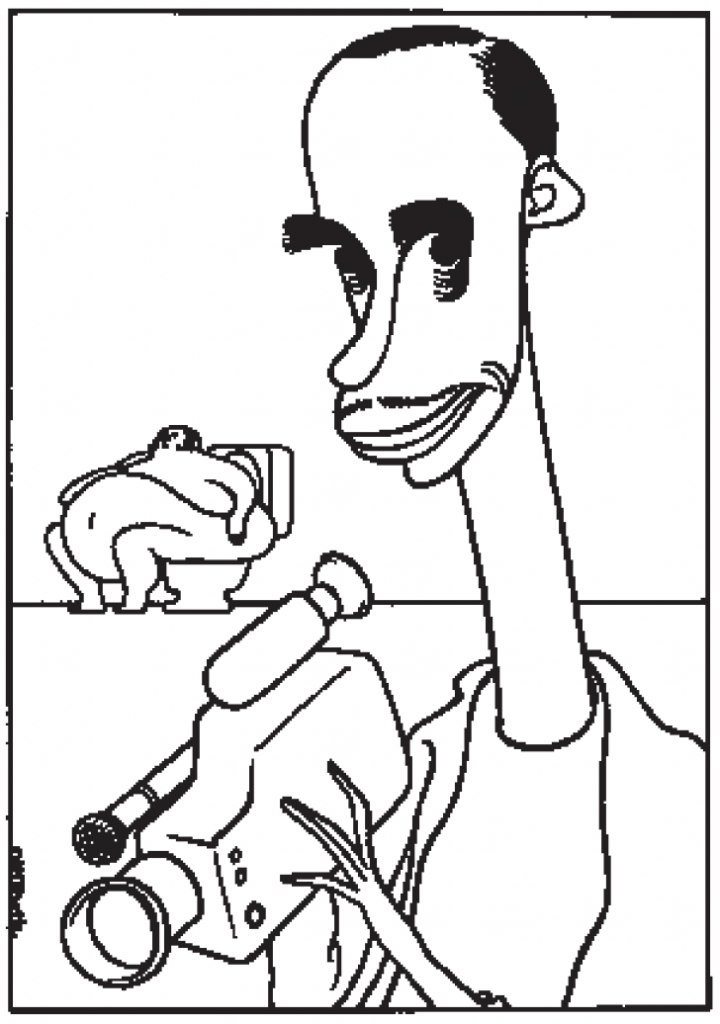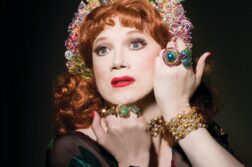In postwar Baltimore, where he was born in 1946 and went to Catholic school, John Waters was an unusual child. The Wizard of Oz may have been his favorite movie, but he rooted for the Wicked Witch. “I even tried dressing up like the Witch to terrify my neighborhood friends,” he wrote in his autobiographical book Shock Value, “but succeeded only in raising a few eyebrows.” He fantasized about killer Ferris wheels and begged his mother to take him to the junkyard, where he looked at the twisted hulls of wrecked cars and imagined satisfyingly horrible crashes. He earned a child’s fortune by staging puppet shows for younger kids, but there, too, his rebellious streak won out: he frightened audiences with his macabre puppets and lurid scenarios until local parents stopped engaging his services.
In 1964, while still in his teens, Waters made his first movie, Hag in a Black Leather Jacket, a short film in which an interracial couple is married in a ceremony officiated by a member of the Ku Klux Klan. Clearly, Waters saw that America’s placid surface during the Eisenhower and Kennedy years masked hypocrisy and scandal. He joined marches and demonstrations for social justice and against the war in Vietnam. In all of his films, Waters undermines the normal in two basic ways: by having outlandish characters display exaggerated reactions to mundane circumstance, or by making the characters who appear most “normal” behave the most bizarrely.
 Influenced by the underground films of Andy Warhol, Kenneth Anger, and the Kuchar brothers, among others, Waters assembled a repertory troupe of players headed by an effeminate neighbor, Harris Glenn Milstead, whom he christened Divine. Waters made a national splash with Pink Flamingos, an epic contest for the title of “filthiest person alive” in which Divine, as Babs Johnson, emerges as the clear victor by eating dog shit onscreen. Early in his career, Waters was frequently targeted by the Maryland State Board of Censors; its sanctimonious head, Mary Avara, once said she would like to throw him out of a window.
Influenced by the underground films of Andy Warhol, Kenneth Anger, and the Kuchar brothers, among others, Waters assembled a repertory troupe of players headed by an effeminate neighbor, Harris Glenn Milstead, whom he christened Divine. Waters made a national splash with Pink Flamingos, an epic contest for the title of “filthiest person alive” in which Divine, as Babs Johnson, emerges as the clear victor by eating dog shit onscreen. Early in his career, Waters was frequently targeted by the Maryland State Board of Censors; its sanctimonious head, Mary Avara, once said she would like to throw him out of a window.
In his latest comedy, A Dirty Shame, Waters stages a battle for the soul of a Baltimore neighborhood. The opponents are the puritanical “neuters” commanded by a storekeeper called Big Ethel and the sex-crazed apostles of a local saint known as Ray-Ray (played by Johnny Knoxville, the chief prankster of the Jackass television series and film).
Waters’s originality stems from the combination of his political radicalism and cutting-edge æsthetic with the instincts of an old-fashioned showman. As the painter Robert Irwin, philosopher Arthur Danto, and others have observed, the history of art is marked by ever-widening claims for the rightful territory of art, in terms of both subject matter (content) and form. With his unusually inclusive sensibility, Waters fits neatly into this tradition, while his desire to unmask and attack injustice and hypocrisy gives his films their element of political provocation. By putting “unacceptable” events and people on movie screens, Waters magically negates their threat and enlarges the sympathies of his audience. His urge to shock and amuse marks him as an entertainer. He’s still raising eyebrows.
Greg Varner: I enjoyed A Dirty Shame, which I found provocative and risky. To make the argument for pleasure as forcefully as you do in this movie seems brave in America today.
John Waters: Thank you. It doesn’t seem brave to me. I just made the next movie, and if it came out that way, I’m happy. It may have been brave of the people who gave me money to make it. Maybe it was brave of the distributors. We’ll see what happens with this atmosphere right now, the way the moral climate is in America. I don’t know those people! I don’t know one person who was ever mad about Janet Jackson showing her nipple. I never met one person who was upset. I have no contact with them, and I don’t think I need contact with them for this movie to do well. I think there’s enough of us. I didn’t ever expect an NC-17 rating. I expected it to be, I guess, a little eyebrow-raising. But the notes I got from the studio as we started said “Make this exact movie,” not “Change it.”
GV: Are you afraid, for commercial reasons, of the NC-17 rating?
JW: No, not afraid. I don’t know what’s going to happen with it. In some ways, it’s kind of a new, exploitable thing. People don’t even know what NC-17 means! That’s what shocked me—people I know who go to movies! So I guess we’ll be OK. I think when it hits is with the video and DVD and all that. That’s where people in mid-America see movies, and there are big chains that won’t carry [movies with the NC-17 rating]. That’s what I’m mad at the Motion Picture Association about—not giving me the rating—that they don’t go out there, with their power, and make those stores change that policy. That’s a brand that they’re asking me to go out with, the same way an R is, and PG and a G. This is something they thought up, and that we’re selling for them, to keep them in business, really. And they say it’s so there isn’t censorship, and maybe they’re right, in some ways, about that. There isn’t anything the matter with NC-17—but then why does everybody in the press say “slapped with”? “Branded with”? They don’t say “rated with.” This movie is not explicit. It’s a comedy. So now it’s sending the message that you can’t even talk about sex unless you’re over eighteen. It seems to me we had billboards everywhere in Baltimore that said “Talk to your children about sex,” from the mayor’s office. Now, I’m not saying that every mother would want to sit there with her kid. I wouldn’t want to sit with my parents and watch this! But at the same time, it’s not mean-spirited. It’s not against women. It’s not against anybody! And neuters, just mind your own business and we will leave you alone.
GV: It’s definitely pro-bear!
JW: All gay people know about bears, and no straight people know about bears. And I’d say bears are by far the biggest minority in this movie. There are bear magazines and everything, and straight people really don’t have any idea about it. How did that not cross over? They’re pretty visible. When I was in San Francisco, BearQuake was there, which was how I sort of got the idea to use it, because there really were thousands of bears! And I love all the vocabulary. I heavily read The Bear Handbook, which is a great reference book, and we were trying to get [an article in the magazine]American Grizzly. Johnny [Knoxville] wanted to be in it, and they wouldn’t [invite him]. They’re not interested in celebrities at American Grizzly. They want nude bears! Johnny loved the bears. Even the bears, when I talk to them, seem so serious about it. They don’t seem to laugh about it at all. I said, “Did you tell your parents you’re a bear?” I’m sorry, I would start laughing. I mean, how liberal can parents be? “We know you’re gay—what? You’re a bear? What does that mean? Do I have to hide the cereal?” It could be a great comedy skit—coming out to your parents as a bear. The vocabulary is fun: “husbear” and “otter” and all that. It’s so great! The vocabulary of any underground—I don’t care if it’s straight bikers or what—I’m fascinated by their vocabulary because it’s a secret language. That’s what I love about the bears most. This subculture seemed to advance fairly quickly, and grew really fast, and was accepted really fast in the gay world, and the odd thing about it is that all straight middle-aged men are bears, usually. But you can’t be a straight bear; you’re just a man.
GV: Even the lobby poster for A Dirty Shame is a little risky, compared to the norm.
JW: Selma Blair said, “God, we all look so ugly in it.” I don’t think they do, but movie stars are a little vain. I’m vain when I see pictures of myself in magazines! I think, Oh, God, look at that picture. When they come to my movies, they have to play regular people. My movies aren’t about glamorous people. They’re glamorous to me, but they have to look kind of … not their best. Tracy Ullman in real life really looks great, but she’s pretty fearless. Chris Isaac played a nerd—something he isn’t ever in real life—really just the opposite of his image. Johnny Knoxville looks pretty good always, but he looks to me like a Baltimore boy. I could believe in him as a Baltimore saint of sex. He fit in quite easily in Baltimore. He’s a great guy. He’s a good actor, too. This movie was financed because of him. He had just had Jackass, and I think [investors]liked the idea of us together. Jackass was like Pink Flamingos, in a way. I mean, he would have eaten shit if we hadn’t, and he would have been as joyous about it. The MPAA made us make his tongue smaller on the poster. It’s amazing: they approve the trailer, the movie ads, the posters, everything. I didn’t even realize that in all the time I’ve been doing this. On that poster, Johnny’s tongue had to be littler, Selma’s breasts had to be smaller, and Tracy couldn’t be looking at Selma’s breasts with her tongue like that. I look at the poster and it’s really hard for me to imagine, because I’m so close to it, just what a regular person who comes in off the street might think of the movie. People say to me, “Where did that come from?” I don’t know, really. It came from my entire life. I was always interested in things I don’t understand. I’m glad I’m not an adult baby. Life’s hard enough without having to secretly go home, get in a bathinette, and have a pregnant woman nurse me. I didn’t put some stuff in because it’s too weird—it’s not funny.
GV: In the press kit for A Dirty Shame, you refer to it as a “sex education comedy,” but I think of it as a religious epic.
JW: Well, it’s a spiritual movie. People pray for sex. When you’re young, you really pray for it. Why not have a sex saint? In the Catholic church they have Saint Dymphna of lost causes. I used to like her. They have a saint for everything. How come there isn’t a sex one? I mean, God gave us sex, they tell us, and it’s good and pure. Even if you believe that you must use it only for having children, why can’t sex be so good that miracles happen? Why can’t it be spiritual? And to me, it is time for a new sex act, with all the other ones that are so dangerous. It would be nice if somebody found a new one that no one had thought of, disease-free! But everything you can ever think of, somebody’s done.
GV: What they come up with in A Dirty Shame seems to be your way of saying, “Knock yourself out!”
JW: Anything is OK to try, as long as it’s safe, consensual, and doesn’t hurt others. We say that right in the beginning [of A Dirty Shame]. I mean, my premiere was an AIDS benefit—I can’t have unsafe sex in it!
GV: Big Ethel reminds me of your old nemesis with the Maryland State Board of Censors, Mary Avara.
JW: She gave me a line that’s in this movie. She said to me once, “Don’t tell me about sex! I was married to an Italian.” One of the neuters says that in A Dirty Shame. It gets a big laugh—only she didn’t mean it to be funny.
GV: I’ve been telling people that in this movie you really seem to have your finger on the pulse of American culture, which today seems more conflicted about sex than ever.
JW: We have this review in Screen International, a magazine like the Variety of the United Kingdom, and it said that A Dirty Shame could possibly influence the election, which really made me laugh. I’m not optimistic, unfortunately. It’s still an election between two neuters. I’m voting for Teresa [Heinz Kerry]. And I’m secretly fascinated with [Bush twin] Jenna. She might “break bad” one day, as they say in Baltimore, and be dancing on tables naked. She’s been puking on tables! Well, I puked when I was 18, too.
GV: Big Ethel also made me think of Barbara Bush.
JW: She went to see Hairspray [the musical]with George, Sr., and she posed with Edna in drag. They said they enjoyed it.
GV: You know Nixon’s famous line about Barbara? “She really knows how to hate.” He meant it as a compliment.
JW: They’re all scary. To me, American politics is scary because they all have to lie to appeal to everybody. I’m so sick of it. I’m for act-up. Bring it back, what the Yippies did. Use wit as terrorism. Humiliate your enemies through humor and make them look silly. That’s something Abbie Hoffman and Jerry Rubin did that was great. We need act-up again big time. We should get straight people to work with act-up; we’ve got to cross over and bring in new blood. Kids don’t care. They’ll fight for gay rights. I just read that book about every second of the Stonewall riots. [Waters is probably referring to David Carter’s Stonewall: The Riots That Sparked the Gay Revolution. —GV] Straight people helped then, too. We need everybody who doesn’t like what we don’t like. Who cares who they fuck later? Just come to the barricades with us!
Greg Varner has written for the Washington Post, OUT magazine, Classical Music, and other journals.




